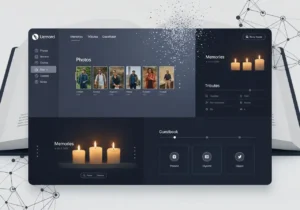1. Digital-First Memorials and Online Tributes
 The migration from traditional print death notices to online platforms has accelerated. One article notes that obituaries are now “more personal” thanks to digital formats. Families are increasingly opting for online memorial pages, multimedia elements (photos, videos) and global reach rather than local newspaper listings.
The migration from traditional print death notices to online platforms has accelerated. One article notes that obituaries are now “more personal” thanks to digital formats. Families are increasingly opting for online memorial pages, multimedia elements (photos, videos) and global reach rather than local newspaper listings.
This shift means platforms are choosing flexibility, shareability and permanence. As one source explains: “Legacy-preserving digital memorials … accessible worldwide.”
2. Personalization & Narrative Focus
Obituaries in 2025 tend to emphasise the story of the person over a formulaic list of facts. Rather than simply announcing death, they provide narratives of life, achievements, quirks and relationships. Personalization also comes through in service styles and memorial formats: tailored gatherings, themed tributes, and digital guest books.
3. AI, Automation and Efficient Tribute Creation
 One of the newer developments is the use of artificial intelligence in creating obituaries and memorial content. According to a recent report, many funeral homes and families are adopting AI tools to help craft meaningful tributes — citing ease, speed and support in grief.
One of the newer developments is the use of artificial intelligence in creating obituaries and memorial content. According to a recent report, many funeral homes and families are adopting AI tools to help craft meaningful tributes — citing ease, speed and support in grief.
However, some experts caution that while AI brings convenience, it may lack the depth of human-written narratives and may introduce errors or factual inconsistencies.
4. Ethical Challenges, Privacy & “Obituary Piracy”
With the growth of digital memorials comes new risks. One worrying trend is “obituary piracy” — unauthorised copying or fabrication of obituary content for ad revenue or clickbait. As the Wikipedia overview notes: “Obituary piracy … unauthorised copying or re-fabrication of online obituaries … to generate revenue.”
Media outlets and funeral-care providers are under increasing pressure to safeguard accurate tributes, respect families’ wishes and protect personal data. Digital memorial platforms must balance accessibility with dignity and privacy.
5. What This Means for Families and Publishers
For families planning memorials: consider platforms that support multimedia, guest contributions and a shareable link. Choose formats that reflect the individuality of the person remembered, rather than default templates.
For publishers and funeral-services: designing obituary content and tribute services for mobile, social sharing and global reach is increasingly important. Planning for personalization, timely publication and digital discoverability will influence reach and meaning.
